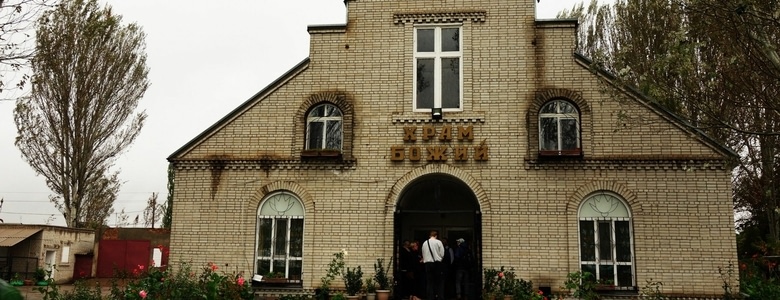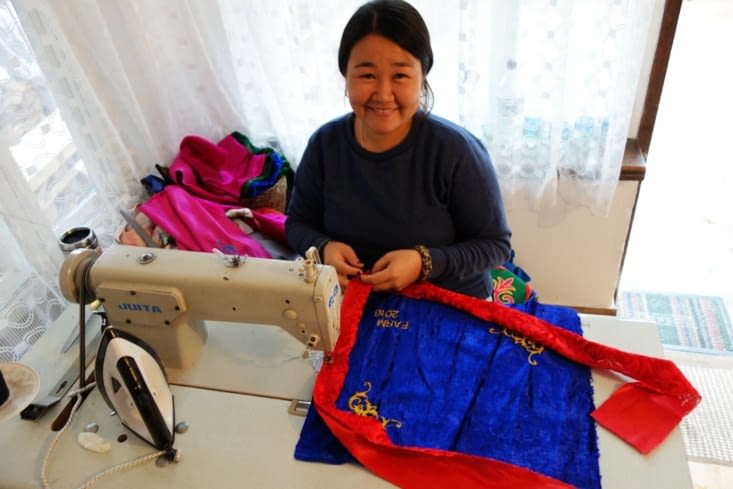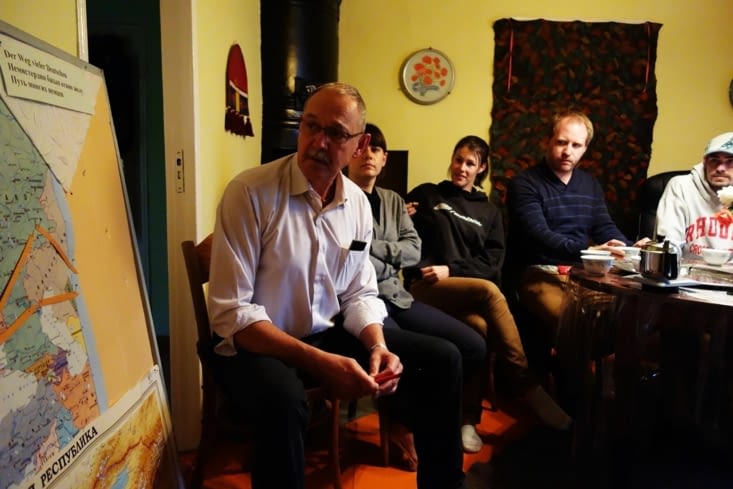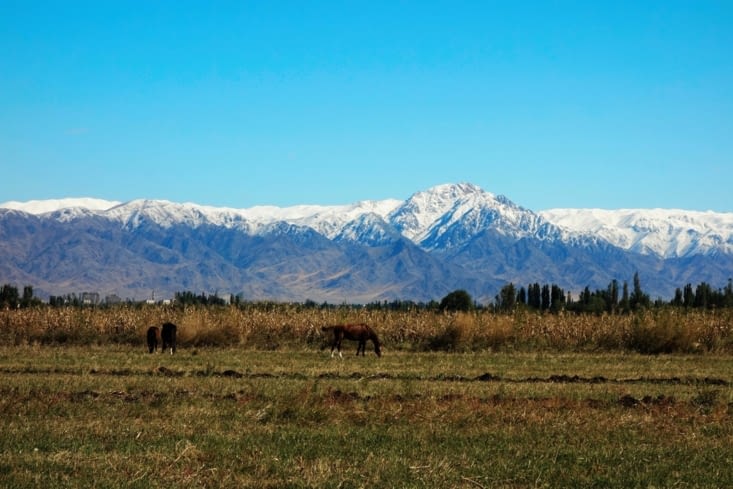
Français
Le 2 Octobre, nous retrouvons Mattiew et ses amis pour une journée à Rot Front, un village à 1h30 de route de Bishkek, où il est censé il y avoir des jeux nomades traditionnels. Nous arrivons à Tokmok à 11h, où un autre groupe de personnes nous attend sous le porche d'une église. Parmi les deux groupes, plusieurs nationalités sont représentées : Zimbabwe, Malte, Canada, Pays-Bas, Isreal, USA, France et Kirghizstan bien sûr ! Une canadienne du nom de Julia fait les présentations, elle fait partie d'une association d'aide à des orphelins et organise cette journée. Cette association a une ferme, un petit atelier de fabrication de savon fait main et de couvre-oreillers. Ces activités sont gérées par les locaux et les orphelins, cela permet à ces derniers d'avoir un endroit où aller et d'acquérir des connaissances. De plus, l'association lève des fonds pour les envoyer à l'université.
Julia a organisé cette journée pour ressembler orphelins, locaux et touristes (dont certains sont des bienfaiteurs de l'association). C'est une façon de fédérer les gens et pour nous d'en apprendre plus sur la culture kirghize.
English
On 2nd October we join Mattiew and his friends to a one day trip to Rot Front, a city 1h30 away from Bishkek where it is supposed to be a nomad game and traditional shows. We arrive in Tokmok around 11h where another group of people are waiting for us. We gather in front of a church. Both groups together, it counts a large quantity of nationalities : Zimbabwe, Malta, Canada, Netherlands, Israel, USA, France and Kirghistan (of course!). A Canadian woman called Julia, who is one of the organizers of the day, makes people comfortable by introducing people each other. She is member of an association for orphan children. The association has a farm, a small handmade soap local factory and pillow case production. These activities are managed by local people and orphan teenagers. It's a way to give them a place to go and learn skills. Besides, the association gathers funds to pay them better education, like university.
Julia has organized this day to gather the local, orphan and tourists (some of them are in fact sponsors of the association) together. It is a way to federate the people and a way for us to discover in deep Kyrgyz culture.

Français
Il pleut et nous attendons un moment sous le porche de l'église. Finalement Julia est désolée de nous informer que certains activités doivent être annulées. Nous devions voir un jeu nomade qui ressemble à du polo (mais avec une chèvre vivante comme balle), cependant il est trop dangereux pour les chevaux de jouer sous la pluie. Malgré notre déception, nous prenons une voiture pour rejoindre la ferme située à Rot Front où un repas chaud nous attend. C'est une soupe chaude faite de tomates, betteraves rouges, oignons, viande et pommes de terre, appelée Borsh. C'est très bon et cela nous réchauffe.
English
It is raining so we stay under this shelter for a while. Then Julia is sorry to say that some activities have to be canceled because of the rain. We were supposed to see a traditional nomad game (like polo with an alive goat as ball) but the players cannot play under the rain. Despite of our disappointment, we take a car to join the farm, located in Rot Front, where a hot meal was waiting for us. It is a Borsh, an hot tomato, beetroot, onion, meat and potatoes soup. It is really good and it makes us warmer.
Français
Après le repas, nous entendons des cris aigus. Derrière nous arrive un homme avec un imposant aigle. D'après son propriétaire, il crie car il est encore jeune, malgré sa taille. L'homme porte un costume traditionnel avec un Kalpak, le chapeau que Julien a essayé dans le magasin de souvenir lors de notre premier jour à Bishkek.
Le propriétaire nous explique qu'ils capturent les aigles petit, quand ils sont dans les nids. Puis ils les dressent pour la chasse, en accrochant un renard mort à la queue d'un cheval qui court. Les aigles peuvent chasser des lapins et même des renards, lors de la période de la chasse en Novembre.
Il est possible de porter l'aigle. S'il est déséquilibré, il ouvre ses ailes pour garder son équilibre, comme vous pouvez le voir sur la photo. C'est très impressionnant de porter un énorme aigle qui ouvre ses aigles et crie à 20 centimètres de soi !
English
After the meal we start hearing some high-pitched screams. Behind us was arriving a man with a big eagle. It is big but it is still a baby. It is shouting because it is still young according to the explanations of the owner. The guy wears a Kirghiz traditional outfit with a Kalpak, the traditional hat that Julien tried in the souvenir shop the first day in Kyrgyzstan.
The owner explains that they capture the eagles when they are babies, in the nest. They train them to hunt. To do so, they attach a died fox at a horse tail while it is running. After their first huntings, they are considered as adult eagles. They can hunt rabbits and even foxes! The hunting season is November.
It was possible to carry the eagle. If it is destabilised, its wings open, as you can see on the picture. It is very impressive to see a big eagle opening its wings and shouting just 20 centimeters from you!
Français
Après ces intéressantes explications sur la chasse avec les aigles, nous allons dans un petit musée. Ce village a été fondé par des Mennonites d'origine allemande, à la fin du 19ème siècle (un mouvement chrétien évangélique, parallèle au protestantisme). Leurs ancêtres ont quitté l'Allemagne quelques 300 ans auparavant, pour fuir le service militaire obligatoire, puis ont vécu en Ukraine et en Russie, avant d'arriver en Asie Centrale. Le propriétaire de la maison est venu ici il y a 7 ans pour enseigner l'allemand (il est payé par le gouvernement allemand). Il a reconstruit cette maison et l'a transformée en musée, c'est très mignon. C'est une maison traditionnelle, dans laquelle il donne des cours d'allemand à une dizaine d'enfants. Il nous explique l'histoire et la migration de ces allemands kirghizes. Ils étaient près de 5% de la population du pays dans les années 90. C'est intéressant de noter que les gens qui parlent allemand ici parlent en fait une vieux allemand, car leurs ancêtres ont quitté l'Allemagne il y a longtemps. Lorsque certains d'entre eux retournent en Allemagne, ils ont ainsi parfois du mal à se faire comprendre. De plus, ils ont parfois du mal à s'habituer au mode de vie, avec toute la bureaucratie de la vie « moderne » qui va avec, car c'est trop éloigné de la vie simple de la campagne kirghize.
English
After all those interesting explanations about the eagle hunting, we went to a small museum in the village. In fact, this village was founded by people of German origin at the end of the 19th century. They were Mennonite people (a Christian group belonging to the church communities of Anabaptist denominations), who left Germany some 300 years ago to escape forced military service, and then lived in Ukraine and Russia and finally arrived in Central Asia. The owner of the house came here 7 years ago to teach German (he is paid by the German government). He has rebuilt this house and turned it in a museum, it's very pretty. It's a traditional house, where he gives German lessons to a dozen of children. He explains us some geographical and historical facts about German people in Kyrgyzstan. They were about 5% of the whole population of the country in the 90's. It's interesting to notice that the people from German origin speak in fact an old version of the German language, because their ancestors left Germany a long time ago. When some of them go back to German, they have sometimes difficulties to be understood. Besides, they sometimes fell uneasy with the way of life in Germany, all the red tape and so on, compared to the simple life in the countryside of Kyrgyzstan.

Français
De retour du musée, il est l'heure de manger de nouveau! Certaines personnes de l'association ont préparé un Plov et du pain frit, pendant que d'autres jouaient aux cartes. L'atmosphère est très détendue et les gens sont contents même si le temps est froid et humide. Nous discutons avec l'un des orphelins, il étudie maintenant la psychologie à l'université et a appris l'anglais en seulement deux ans avec les canadiens de l'association. A un moment, l'un des bénévoles annoncent que grâce à l'un des touristes canadiens et au Rotary Club auquel il appartient, l'association va être capable de payer les études de trois jeunes filles jusqu'à l'obtention de leurs diplômes. Tout le monde sourit et applaudit !
English
Back from the museum, it is time to eat again! Some members of the association have prepared Plov and fried bread, while others have played cards in the living room. The atmosphere is very relax, people are happy even if the weather is very cold and humid. We discussed with one of the orphans, he's now studying psychology at university and can speak very well English, he has learned in only two years with the Canadian people of the association! At a time, one man of the association announced that, thanks to some Rotary clubs in Canada and one guy of the tourist group, they will be able to finish to pay the university for 3 young girls until they complete their degrees. Everybody grin and cheer !
Français
La nuit tombe et il est temps de quitter ces gens très chaleureux et engagés dans une bonne action. Une fois revenus sur l'axe routier principal, nous quittons aussi Mattiew et ses amis qui retournent à Bishkek. Puis nous trouvons un hôtel où passer la nuit à Tokmok.
Le lendemain nous prenons un taxi pour la tour
« Burana » à 30 minutes de route. Cette tour est un ancien minaret, l'un des derniers vestiges d'une ville construite au 9ème siècle. Elle fait aujourd'hui 25 mètres de hauteur.
Lorsque nous arrivons sur place, nous nous retrouvons dans une immense steppe désertique entourée par les montagnes. C'est magnifique ! La vue depuis le haut de la tour est à couper le souffle. Le soleil est au rendez-vous, il se reflète sur les sommets enneigés des montagnes.
English
The night is coming and it's time to leave these warm people doing a good deed. Once come back on the main road, we also leave Mattiew and his friends who go back to Bishkek. Then we find a hotel for the night in Tokmok.
The day after, we take a taxi to go to the
Burana tower, 30 minutes away. This tower was a minaret and is what remains of an ancient city built at the 9th century. It is now 25 meters high.
Once there, we are in a huge steppe surrounded by mountains. It's amazing and the view from the top of the tower is breathtaking. The weather is sunny and the sun is reflecting in the snow-capped mountains.

Français
Pendant 1 heure, nous sommes quasiment les seuls touristes. Nous sommes ensuite rejoins par un groupe de Chinois puis de Hollandais. Nous décidons donc de nous éloigner pour visiter le petit cimetière attenant à la tour. Sur certaines pierres tombales, il y a des pétroglyphes (inscriptions gravées dans la pierre).
English
For one hour, we are almost the only tourists here. Then a Chinese and a Dutch groups arrived, so we go to visit a small cemetery nearby. On some graves, there are petroglyph (drawings carved in stone).
Français
La visite est assez rapide et nous rejoignons la route pour héler un taxi. Cependant, la seule route est assez excentrée et 3 voitures y passent par heure. Pour multiplier nos chances, nous arrêtons toutes les voitures et demandons à faire du stop. Heureusement le paysage est magnifique ce qui rend l'attente plus facile.
C'est la saison des pommes et nous ramassons quelques pommes tombées sur le bord de la route pour agrémenter notre pique-nique. Et finalement, après plus d'une heure d'attente, un taxi passe et accepte de nous prendre ! Nous rejoignons Tokmok et nous partons pour notre prochaine destination : le lac Issy Kul.
English
The visit is quite quick and we go back to the road to find a taxi. However the only road is quiet small and there are only 3 cars per hour. To multiply our chances, we stop every cars and ask for hitchhiking. Luckily the landscape is great and it makes the waiting easier.
It's apple season and we pick up some for our picnic. Finally after more than one hour, a taxi comes and accepts to take us! We go back to Tokmok and we leave for our next destination: Issy Kul lake.